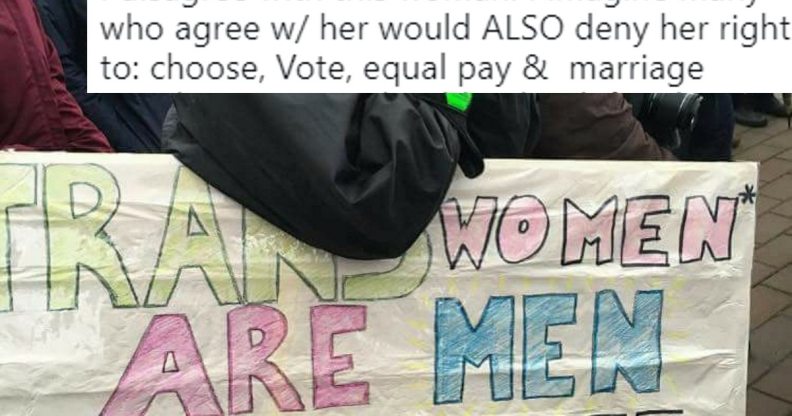The Women’s March was ‘made unsafe’ by anti-trans signs and pussy hats

(Facebook/genderqueer gengar and Twitter)
The Women’s March has sparked outrage with anti-trans signs and exclusionary pussy hats.
Feminist, pro-equality, anti-Donald Trump marches took place across the world over the weekend under the Women’s March banner, on the anniversary of the first of these rallies.
But they were dogged by controversy and accusations that they were unsafe for transgender people after a poster proclaiming that “TRANS WOMEN ARE MEN” went viral.

(Facebook/genderqueer gengar)
The anti-trans sentiment on one particular sign at the Vancouver Women’s March was made worse by the prevalence of pussy hats, which many believe to be exclusionary.
The hats are said to limit the idea of a woman to those who have vaginas.

(Getty)
They fall under the banner of biological essentialism – that is, that a person is made female by their body parts, not how they self-identify.
The sign which has caused the most backlash on social media is one reportedly seen in Vancouver, which read: “TRANS WOMEN ARE MEN”.
Below this false and hateful statement was written: “Truth is not hate. Don’t believe the hype!
“Trans ideology is misogyny & homophobic. Woman is not a ‘feeling,’ a costume, or a performance of a stereotype!

(Getty)
“Woman is a biological reality! There is no ethical or moral duty to lie to soothe a male ego”.
This transphobic message sparked anger.
RuPaul’s Drag Race star Peppermint, who came out as transgender last year, condemned the sign.
She wrote: “I disagree with this woman. I imagine many who agree w/ her would ALSO deny her right to: choose, Vote, equal pay & marriage equality.

(Twitter/peppermint247)
“Women shouldn’t be defined or confined by ANYONE including men, trans-women shouldn’t be defined or confined by ANYONE especially cis-women,” she added.
Fellow Drag Race contestant Jaremi Carey agreed, writing: “This is horrific.
“I was there marching and can say everyone I was with including the fellow marchers that were beside I didn’t know were marching for equality w/views opposite of this fraud.

(Twitter/phiphiohara)
“Please don’t let this one salt your taste of the many allies.”
Carey, who hit the headlines in 2016 when he proposed to his boyfriend on stage, also raised the fact that sign-holder was wearing a pink pussy hat.
The hats were worn en masse last year and this, prompted Donald Trump’s infamous “grab them by the pussy” comments.
But as Twitter users pointed out, basing the idea of womanhood on genitalia is reductive and offensive.
“If anyone asks why I hate the ‘pink pussy ears’ kind of feminists I’ll direct them here,” one said.

(Twitter/CharlotteLotti5)
“If we’re too busy trying to alienate other women because of their bodies how are we meant to get anywhere? How can sewing a s*** hat and being a TERF change our lives for the better?”
Of course, many who attend marches wearing one of these hats will be doing so with good intentions, simply to support women at a time when a misogynist is in the White House.
“As a femme nonbinary person I felt very excluded while at the march. It was really uncomfortable at times ,” one person wrote.

(Twitter/thatbunnybabe)
Another summed it up when they said: “If the pussy hat makes a single woman feel excluded, it’s gotta go.
“If the pussy hat makes a single TERF feel like she’s marching with allies in her hateful fight, it’s gotta go.”

(Twitter/maryknews)
A different sign caught the eye of one Twitter user, who pointed out that “that vote vagina sign in the background is really bad”.
Another person responded: “Legit wondering how big the TERF presence is at these Women’s March events.”

(Twitter)
One person wrote about the original sign: “This picture appears beside TERF in the dictionary, pussy hat very much included.

(Twitter/brodielancaster)
“Reminder that the #terf in this photograph is wearing a pink pussy hat. Juuuuuuuuuuuuuuuust sayin,” said another.
“This #terf s*** is exactly what keeps @womensmarch unsafe for TGNCI (transgender, gender-non conforming, intersex) ppl!

(Twitter/Miamikomancy)
“Where is the accountability for this bigot and countless others like her?”
And British trans activist Paris Lees made an excellent point when she wrote: “‘What shall I put on my placard?’

(Twitter/parislees)
“‘I guess you’ve got to ask yourself, for you, what’s the single most important issue for women in 2018?’
“Calling trans women men'”.

